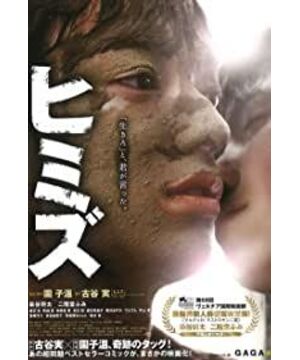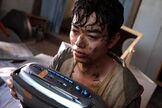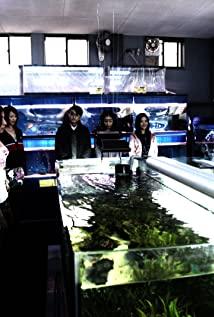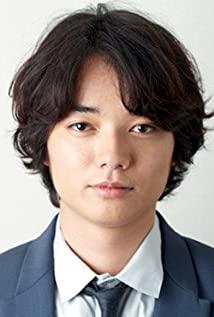I posted a tweet a few days ago. When I chatted with my friends privately, I found that there were different opinions, and I retracted the draft out of respect for the opinions of the contributors.
Because I hadn't seen the movie, I was scolded when we were chatting. Chairman Mao and his elders taught us that "without investigation, we have no right to speak", so I went to watch "Mediocre Talents". Don't hold back, it's a matter of position.
Director Yuan Ziwen, whose name sounds like a Chinese at first, seems to have a sense of harmony in the ancient world. If you want to maintain this impression of him, you can't go to his encyclopedia, let alone watch his movies, remember.
On March 11, 2011, an earthquake measuring 9.0 on the Richter scale occurred near the waters of Honshu Island, Japan, and the subsequent tsunami and nuclear leakage accident destroyed the lives of countless people.
The protagonist, Yuichi Suida, is an ordinary middle school student. He runs a boat rental yard for tourists. He has a broken family and a pair of sinful parents. debt.
After the disaster, there were some homeless people gathered near the Zhutian house. With his pure nature, he often provided convenience to these people, and the enthusiastic homeless also gave him some small help, so they formed a warm friendship. , a somewhat ideal utopia is formed in the context of disaster.
Keiko Chazawa is Sumita's classmate, a lover of calligraphy and haiku, and is nervous. Her biggest hobby, who has a crush on Sumita, is to write Sumita's usual indifferent quotes on the wall, and then replay it expressively.
In a chemistry class, the teacher talked about Japan's energy utilization in relation to the earthquake and nuclear leakage accident, and wrote on the board the structure of Japan's energy utilization. The proportion of nuclear energy is quite indispensable. cooperation measures to ensure the safe use of nuclear energy.
Full of patriotic passion, he followed the history of Japan's frequent disasters and continued struggle to rise up and warned the students to cheer up in difficult situations, but Sumita expressed that he could not accept such a request.
The teacher said so.
"Human, you can't keep your head down, someone like Sumita who is going to take over the charter yard, his attitude towards life may be very special to him, but everyone is special, everyone is this The only flower in the world, there are no ordinary people."
The teacher encouraged him to forget about his charter yard and shout out bigger dreams.
But Sumita raised his arms nervously and shouted.
"Ordinary is the best."
Underworld loan sharks come to the door from time to time.
The rogue-like father also came to harass him from time to time, forcing him to take out the money from the family at every turn, and very cold-bloodedly hoped that Sumita would die immediately, so that he could get a huge sum of insurance money to pay off the huge gambling debt.
One day, my mother swept away the valuable things in the family, leaving a little money and leaving without saying goodbye.
In another dark night, my father came to the door again, and reiterated his true thoughts of wishing for Suita's death along the way of drunkenness.
The above movie progress bar is halfway through, which is also the main part of the plot. Various characters focus on a small boat rental yard, the protagonist Sumita, the girl Chazawa and all the homeless, the underworld elements and Sumita's parents.
In the second half of the film, the camera followed Sumita, who killed his father and fell into sin, and turned his attention to the streets of post-disaster Japan, a society in a broad sense.
Disasters are always described as Pandora's Box, which unleashes the evil of human nature to explain the crime that evolves under the disaster. But the director set an interesting balance here.
Cha Ze and the homeless still want to restore their lives even in the extreme hardships. Even if it is a small boat rental yard, it must be arranged properly and brightly, the lanterns that should be hung, the walls that should be painted. I can't let it go. The small utopia is full of small life confidence and hope. That's all I think about, and I'm satisfied.
On the other hand, Sumita's parents and underworld elements kept pulling him to the other side. Although he had the idea of an ordinary life, it was difficult to maintain and realize even ordinary life.
For Sumita, how should he choose? A scum in his mouth or something else?
The girl Chazawa has a wealthy family, the same as Sumita, but her family is also full of violence. Her mother blames her for the misfortune of her marriage and the downfall of her life. to kill her.
Chazawa likes Sumita because he is another existence of his own, he can make the voice he wants to make, and he can comfort himself with hope and loneliness in another corner.
Therefore, when Sumita encountered misfortune, Chazawa always gave her all the help she could, to help him organize his own life, that is, to help himself.
The same goes for the homeless Yono, who lost everything in the disaster with a huge sense of self-blame. He blamed himself for not taking responsibility for his family. He would rather bear the risk of crime and work hard to help Sumita return to the life that a child should have.
The underworld elements and Sumita's parents are the complete opposite.
"I Know It All"
I know that flies fall into milk, black and white at a glance;
I know it too, I know it all.
I know my identity by dress, and I know that too;
Whether the weather is good or bad, I know it, I know it;
I know that apples can be recognized by seeing an apple tree; the diligent and the lazy can see at a glance, and know everything in their hearts, except themselves.
All in all, I know it all.
A healthy complexion is very different from a pale complexion, I know it;
Death will bring an end to all things, and everything is clear to the heart, except itself.
The director first introduced the French poet François Villon's "I Know All", an outstanding lyric poet of the Middle Ages in France who had a troubled and confused life similar to the protagonist. This poem generally conveys a kind of The sense of emptiness in life and the loss of self-identity and value identity reflect the protagonist Sumita's experience from the beginning to the end.
Through Sumita's firm arms call in class and the "Who I am" constantly asked by a desperate person on the street in the second half, the director asks a key theme in the film, namely, "What is ordinary and what is great? ".
The teacher reminded Sumita and the students not to forget the difficult history of Japan, but also potentially to illustrate Japan's rise from the Meiji Restoration to the ravages of the whole East Asia and the post-war economic take-off of Japan, a collective united as one. It is Sumita’s values that should be pursued. In this value system, Sumita’s idea of being willing to live an ordinary life is simply degenerate, and the chartering business cannot be a force for Japan’s recovery after the earthquake.
In a word, the teacher wants to define Sumita's life.
Chazawa, like Sumita, both choose ordinaryness as their life pursuit in such a strong context, which seems deviant, but reasonable. They do not have a happy family. After the disaster, Japan's social morality declined and crime occurred frequently, which made the original Some values are becoming more and more blurred in their hearts. What is the pursuit of a more prosperous life, and a tsunami has also wiped out the once wealthy family of the homeless Ye Ye, and what is the pursuit of a more satisfying family life, what they face This is the general situation again.
They have grown increasingly suspicious of this powerful discourse rule, and the rebellion is an attempt to deviate from the established value system after the collapse and to recreate the self-order.
In the movie, the homeless Yono did not hesitate to commit theft in order to raise money for Sumita. During one of the thefts, a news program was broadcast on the TV of the stolen fascist's home. In terms of his views on the nuclear leakage accident in Japan and the moral decline of Japanese society, he criticized the upper echelons of nuclear power for shirking their own responsibilities, and believed that nuclear energy is unsafe in an absolute sense. The resulting secularization of the transition and the selfishness of people are responsible for the current status quo.
Throughout the story, the disaster scene kept flashing back, the society and homeland were devastated, but the role of the government was missing, and only two aspects were used to explain, one is the teacher who represents the country's collectivist values, and the other is the occasional TV broadcast. .
One or two people were killed and buried on the spot, the homeless people who had nothing in the disaster could not be accommodated, and the issue of nuclear energy safety was entangled...
In the second half, Sumita, who killed his father, found that one of his previously inadvertent evil thoughts had spread, causing the real stage of evil. He decided to self-exile and to take his own way to eliminate the evil in society. Then use sin to realize this last value, and kill those social scum who wantonly hurt others.
The camera then toured the streets of Japan through Sumita's perspective. Some people were struggling in the whirlpool, and some people were confused and didn't know where to look.
At the end, Zhu Tian went around in circles without killing a single person, Cha Ze and the homeless were still guarding the dilapidated rental boat house, picking up what to use, setting up the appearance of imaginary life, warming each other, and continuing. Forward.
In the end, Sumita and the girl ran and shouted to life, and cried to the ordinary on the muddy road.
...
What I can feel is that the film of more than two hours is full of the director's strong value orientation and uncontrollable anger, which suddenly rushed to his face.
I don't know if it's a tribute or the so-called heroes see the same thing, this movie reminds me constantly of Martin Scorsese's "Taxi Driver" in 1976, which reflects the loss of American society after the Vietnam War, with a similar disaster background, Sumita and Travis, played by De Niro, has the same value-identity confusion, and they end up with very similar behaviors of self-imposed exile and self-determination.
What is most worth mentioning is that Sumita's last act of smearing seven colors on his face with oil paint has almost the same sense of ritual as Travis's last iconic mohawk.
But perhaps because of the Japanese director (or maybe not), Sonoko Wen arranged another very warm narrative line outside the extremely pessimistic story line. Stripped of the pessimistic factor, the love between Cha Ze and Sumita appears simple and beautiful. This somewhat reckless and naive girl is almost a muscle to Sumita. , two, three... The homeless people even created a positive atmosphere. Taxi Driver, on the other hand, feels downright lonely and hopeless.
In terms of performance, is it because of the factor of comic change? Everyone's language patterns and behavior patterns are very exaggerated, making it hard to imagine that this is the Japanese expression state, maybe to show the alienation state of people's lives, all in all, the protagonist opens his mouth and screams at every turn. I think it's very funny and comical.
Therefore, this is a pure love inspirational film wrapped in tragic colors under the background of disaster, with a lot of private goods of the director's values.
After reading it, I was reminded of our disaster, full of spirit, unity and courage...
There are always people holding up high-flying flags, intending to cover up the truth, to cover up the pain, and to paint the faces of people the same color to keep you from crying.
WeChat public account:
scrap
WasteFilm
View more about Themis reviews











